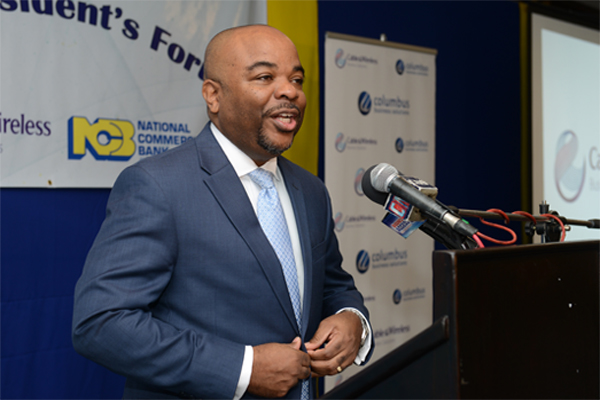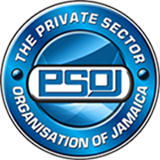
PRIVATE SECTOR ORGANIZATION OF JAMAICA (PSOJ) PRESIDENT’S FORUM
@ 7:45 A.M. TUESDAY, 22 SEPTEMBER 2015
THE JAMAICA PEGASUS
81 Knutsford Blvd, Kingston 5
Salutations
Chief Executive Officer, of the PSOJ – Mr. Dennis Chung
Vice President of the PSOJ – Mr. Gary Hendrickson
Ladies and Gentlemen, Good Morning to you all.
________________________________________________________________________
For years Jamaicans have yearned for Security of their persons and property. Let us be able to roam our beautiful country, conduct lawful business, and raise our children without fear of rogues. To this end we need a well-trained, professional, properly equipped and respected police force.
Respect comes with public trust or, to look at it another way, high public regard.
With respect will come cooperation.
It is important to enhance accountability and transparency in policing in an effort to build trust between the citizens and the police.
For far too long we have been seeing and hearing the perpetuation of a conflict-laden relationship between police and the citizens in Jamaica.
The police ought to be viewed as providing a service to us; not as an oppressor.
It is in this important regard that INDECOM endeavors to contribute.
INDECOM, like many of you here today, strives to see the police grow in goodness.
INDECOM is not against the police. That should not need to be asserted. But I will repeat it. INDECOM is not against the police.
We aim to fairly investigate and to tell truth, to praise, to criticize, to persuade; all in the endeavor of supporting the kind of policing that we need in Jamaica.
Pointing out misconduct is not relished, but must be done. Pretending that nothing is wrong will mean that there will be no improvement. Everyone must feel free to point it out without being accused of being pro-crime.
However, today’s address is not about what is wrong. Today is about catching up with what is right in the relationship between INDECOM and the JCF.
Policing in Jamaica is difficult.
We come into contact with thousands of cases and situations that tell stories of improper action, disproportionate use of force; and impatience. These are evaluated based on the laws of the land and recommendations made accordingly.
We also come into contact with files that tell quite the opposite story, files that tell the stories of hard working, long serving police officers, going about their duty, and even off duty, valiantly intervening in situations and assisting citizens in their time of need; sometimes saving lives.
In the first half of this year more than half of the cases were resolved by INDECOM with no finding adverse to the Security Forces. That is no charge; no disciplinary action.
Rather than the constant story of conflict between INDECOM and the police, let me tell you about the positive efforts at rapprochement.
Meetings with JCF High Command
The Commission’s relationships with the security forces have come a far way since INDECOM began operation in 2010. We now have regular meetings with the JCF High Command. The Assistant Commissioner of INDECOM and the Deputy Commissioner of JCF i/c the Inspectorate meet often, sometimes twice a month.
They discuss practical issues of cooperation on the ground, to smooth conflicts, and to discuss issues discovered by our investigations.
The COP and I have met 4 times in about 1 year. These meetings are always cordial even when we disagee. But we do not often disagree.
From these meetings we have agreed protocols for how our respective members should interact. These have gone a long way to preventing any conflict on the ground. Why should there be conflict when 2 public bodies are about their lawful duties?
Some details of these protocols may shortly be released and at that time more will be said.
Lessons Learnt
Recently we have adopted, and adapted, a UK practice of agreeing and publishing lessons to be learnt from our investigations. In this we note some area of police practice that requires broad reminder. This broad reminder is described in a hypothetical case study and the JCF policy reiterated. The lesson is then published in our quarterly.
Awareness
Apart from the Quarterly the lesson is repeated in our regular awareness meetings with members of the JCF throughout Jamaica.
These sensitization meetings also aim to ensure a deeper and clearer understanding of INDECOM’s role and their responsibilities under the Act.
With such understanding will come the opportunity to dispel unhelpful myths being circulated and foster cooperation. Where we can, we prefer to correct rather than disconnect……..That is charge. We prefer to correct rather than charge. Apologies to the Utility company.
We would like to work with the JCF and donors to create training/information and videos in an effort to tell the story of cooperation and proper conduct to each and every member of the force in a modern, accessible form.
The De-escalation Project
INDECOM’s special project for this year is to collaborate with the police to preach the principles of de-escalation.
By its very nature, policing tends to place law enforcement personnel in situations of conflict with members of the public from time to time. Jamaica is a difficult place to police and the volatile and often unpredictable nature of some of these situations, are such that use of force by police officers is , in some circumstance, inevitable.
Our police officers are especially vulnerable in this regard because they are not often equipped with less lethal weapons. In acknowledgment of this reality, traditional police training tended to focus on a philosophy of exercising authority, dominance and control, as a means of managing conflict and achieving compliance.
Our police force have fairly stringent use of force policies in place aimed at ensuring that their officers are operating within legal guidelines established.
Notwithstanding these policies there is often much public outcry and allegations of excessive and unnecessary use of force over the past two or so decades.
There is often an over dependence by police officers on a “dominance and control” strategy to resolve incidents of conflict with members of the public.
At the end of the investigations into these matters, whether by the Commission, or The Inspectorate of Constabulary, it is sometimes recommended that concerned officers be trained and oriented in a manner that encourages de-escalation and tactical disengagement as strategies aimed at resolving conflicts as opposed to resorting to the use of excessive force by default. Confrontation and force ought to be the recourse only where reasonable and proportionate.
The commitment to human rights based policing must not only be evident through words and protocols, but by a management philosophy that embraces de-escalation and disengagement as operational strategies to be seriously considered and employed as viable options.
This requires senior police management to ensure that all police officers are provided with the training necessary to un-learn what may have been a practice of quickly resorting to the use of unnecessary force to gain compliance, and instead utilizing communication skills and patience to resolve conflicts where possible. Inherent in the shifting of a traditional mind-set to take immediate and offensive action will be the need to understand the benefits of employing other options, to all concerned.
I wish to emphasize that a de-escalation model does not suggest that officers must exhaust one option before considering the appropriateness of others. Indeed the rapid escalation of an incident may dictate that an officer move directly to a lethal force option to effectively mitigate the risks created.
Several studies have been published on this matter of de-escalation and restraint. The National Institute of Justice (writer Philip Bulman) suggested that less lethal weapons decrease rates of police officer and offender injuries. Less lethal weapons mean more options. A part of our mission is to nudge the policy makers to continue to look in this direction as advances in less lethal technology offers promising options in more effectively controlling resistant or violent suspects with fewer injuries.
With the mutual cooperation between the Commission and the Security Forces and the ongoing public relations efforts such as this de-escalation initiative, I am optimistic that the country will benefit from a further decrease in the number of complaints against the security forces.
Public respect in the police will grow as they are regarded more and more as a professional, accountable service. The Public will know that misconduct will be detected and corrected.
Ladies and gentlemen, properly addressing crime, will not come from restricting and abusing rights. Rather it will come from respecting and observing these rights. We must therefore identify oppressive conduct and corrupt conduct.
In the next five years, it is our intention to continue reaching out to the good men and women of our security forces. We will continuously replace misinformation with the truth, and to encourage understanding and cooperation. Let there be no more disconnect!
Public support comes from public trust; make the connection.
